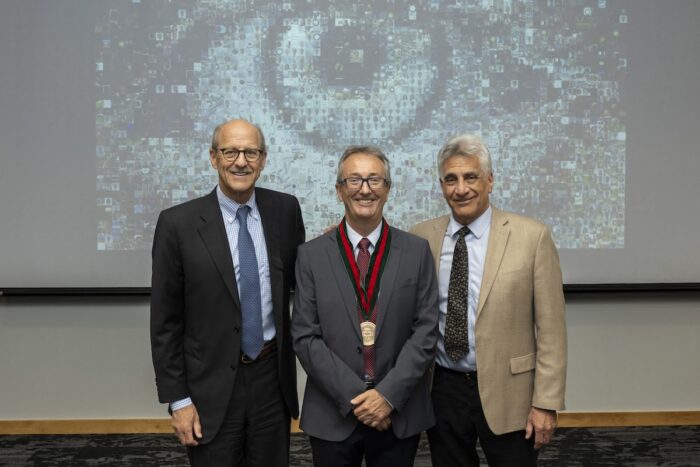Bassnett installed as inaugural Nelson Lacy professor
National leader in vision research recognized for contributions to understanding visual processes
 Dan Donovan
Dan DonovanSteven Bassnett, PhD, has been named the inaugural Grace Nelson Lacy Distinguished Professor in Ophthalmology at Washington University School of Medicine in St. Louis. Pictured at his installation ceremony are (from left): David H. Perlmutter, MD, executive vice chancellor for medical affairs, the George and Carol Bauer Dean of WashU Medicine, and the Spencer T. and Ann W. Olin Distinguished Professor; Bassnett; and Todd P. Margolis, MD, PhD, head of the John F. Hardesty, MD, Department of Ophthalmology & Visual Sciences.
Steven Bassnett, PhD, a national leader in vision research, has been installed as the inaugural Grace Nelson Lacy Distinguished Professor in Ophthalmology at Washington University School of Medicine in St. Louis. The professorship is funded through a gift from the late Grace Nelson Lacy, an educator and WashU alumna who suffered from glaucoma for much of her adult life.
“Grace Nelson Lacy’s generosity and vision – both literal and metaphorical – will advance groundbreaking research that could transform how we understand and protect human vision,” said Chancellor Andrew D. Martin. “Her legacy will be honored through Dr. Bassnett’s important work to uncover medical breakthroughs to prevent and treat vision disorders.”
Bassnett was installed by David H. Perlmutter, MD, the George and Carol Bauer Dean of WashU Medicine, executive vice chancellor for medical affairs and the Spencer T. and Ann W. Olin Distinguished Professor.
“Dr. Bassnett’s work exemplifies the very premise of our belief that basic science is the key to advances in medicine,” Perlmutter said. “The lens is a unique tissue that must be completely transparent for proper vision. His research focused on how the lens develops and evolves over a lifetime is truly fascinating and important to understanding normal visual and how it is impacted by diseases such as Marfan syndrome and other connective tissue and inflammatory diseases.”
Throughout his career, Bassnett has studied lens development and growth, including the processes that dictate lens size and shape. His collaborative work with mathematicians, physicists and biomedical engineers at WashU and around the world explores the role that physical forces from the fibers that support the lens have on its growth from birth through adulthood. These so-called ciliary zonule fibers hold the lens in place and help the eye focus on objects near and far.
Bassnett’s research on ciliary zonule fibers has implications for vision problems, such as those that result from Marfan syndrome, a connective tissue disease that also can cause dislocation of the lens as well as cataracts and glaucoma. More recently, Bassnett and his team have been examining the association between zonular proteins and certain types of glaucoma. Together with the clinical glaucoma specialists at WashU Medicine, he has identified proteins that accumulate in the eyes of patients with glaucoma, providing potential biomarkers for future therapies.
“The installation ceremony is a testament to Dr. Bassnett’s exceptional dedication to advancing our understanding of visual system function and dysfunction and the enduring support of the Grace Nelson Lacy Distinguished Professorship in advancing vision research,” said Todd P. Margolis, MD, PhD, the Alan A. and Edith L. Wolff Distinguished Professor and head of the John F. Hardesty, MD, Department of Ophthalmology & Visual Sciences. “He is most deserving of this honor.”
Bassnett’s scientific contributions are widely recognized within the field of vision research. In 2016, he received the Cataract Research Award from the National Foundation for Eye Research that recognized his work, together with Alan Shiels, PhD, a professor of ophthalmology & visual sciences at WashU Medicine, that identified the gene responsible for inherited cataracts, providing an explanation for lens clouding. More recently, he was awarded the Distinguished Research Award from the Marfan Foundation for his work on the genetic disorder.
Bassnett has chaired the Anterior Eye Disease study section and served on the National Advisory Eye Council of the National Eye Institute (NEI) of the National Institutes of Health (NIH). He has been funded continuously by the NEI since he arrived at WashU Medicine in 1995 as an assistant professor.
Bassnett earned a bachelor’s degree in marine biology in 1982 from the University of Wales and a doctoral degree in biophysics from the University of East Anglia in Norwich, England. He completed postdoctoral work at the Uniformed Services University in Bethesda, Md., studying the cell and developmental biology of the eye.
About Grace Nelson Lacy
Before passing away in 2006, Nelson Lacy devoted her career to implementing arts and humanities into elementary and high school curricula. She led an art appreciation program for youth at the New York State Department of Education in the early 1960s. She also taught at the Normandy schools in St. Louis County.
During her teaching career, she won numerous awards for excellence. In 1998, she received WashU Medicine’s 2nd Century Award, an honor that recognizes long-term commitments that benefit the medical school.






